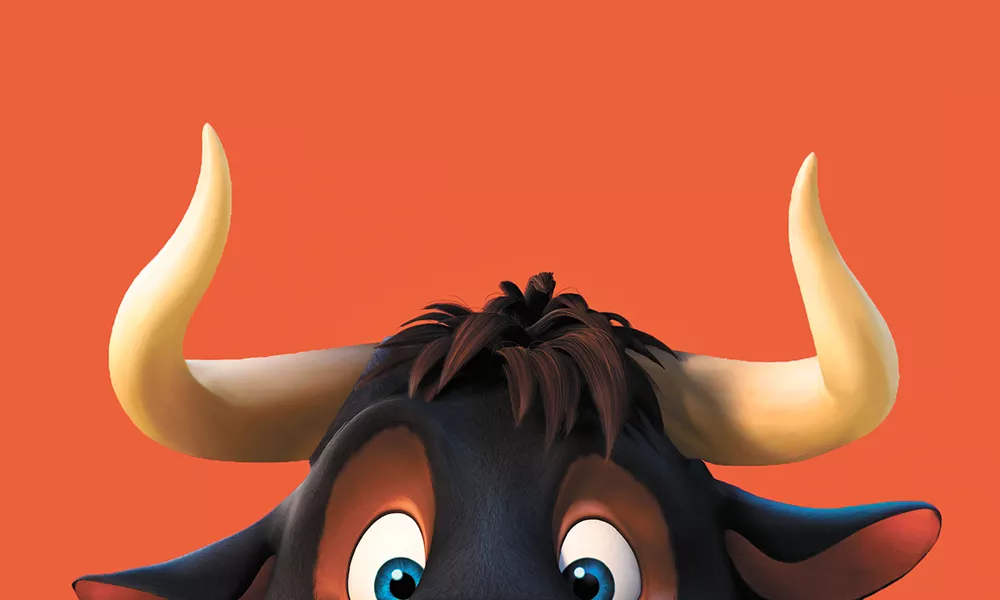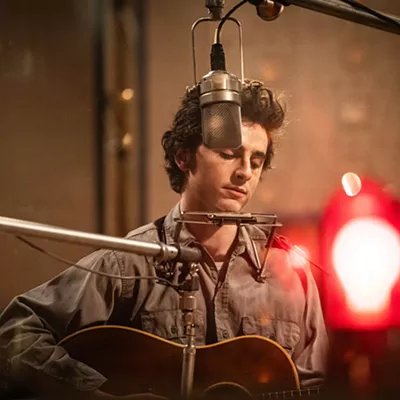When the now-beloved children's book The Story of Ferdinand was first published in 1936, some grown-ups were worried that it might have a bad influence on children. Apparently its sweet, simple story — from writer Munro Leaf, with instantly iconic illustrations by Robert Lawson — was seen as promoting (take your pick) pacifism, fascism, communism and/or anarchism.
To be fair, its tale of a bull in Spain who wasn't interested in bullfighting and only wanted to loll about in fields of flowers could certainly be taken as pacifist. Maybe it wasn't even unreasonable to see Ferdinand as an anarchic hero: If bulls (or people) suddenly got it into their heads that they could just do whatever they wanted, contrary to whatever their "rightful" place in the world was, maybe that would have led to anarchy.
I wish those hand wringers could see Blue Sky's new big-screen take on Ferdinand. They'd freak out, because this Ferdinand moves that "anarchy" way beyond the standard cartoon-movie message of "be yourself" and into a realm that overtly criticizes cultural presumptions and expectations as tyrannical. Ferdinand celebrates an odd outsider not merely for his own sake but for how his defiance of convention and his daring to be true to himself highlights just how dangerous those conventions can be.
The notion to cast WWE wrestler John Cena as the voice of Ferdinand was an absolute stroke of genius, not least because Cena has been making a bit of a mark for himself in live-action comedies as an unexpectedly sensitive soul in a big, scary body. There's plenty that's silly and downright goofy here — this is a movie for children, after all — but there's never anything "funny" in Ferdinand's gentleness, in his lack of interest in knocking heads with the other bulls, in his love of small furry critters and delicate flowers.
What humor is derived from Ferdinand's disposition is of a melancholy sort, as he attempts not to have the devastating impact on his surroundings that his "freakish hugeness" sometimes makes inevitable. There is a literal bull-in-a-china-shop sequence here, in which Ferdinand is trying so very hard not to cause any damage, that is absolutely lovely in how it plays with kiddie comedy, mining hilarious suspense out of incipient slapstick.
The brief source material has obviously been expanded to fill a feature-length film, but the core story remains the same. Ferdinand has no desire for the arena, and longs only to frolic in fields of wildflowers chasing butterflies. Big new chunks of story come in a runaway Ferdinand's sojourn on a flower farm with a little girl called Nina (the voice of Lily Day), who treats him like a pet, and her dog Paco (Jerrod Carmichael), whom Ferdinand calls a brother.
"A dog and a bull can't be brothers," Paco insists. "That would be weird."
"I guess weird is the new normal," Ferdinand replies happily.
"Weird" as a personal achievement, in the sense of breaking free of social pressure to conform, is a flag this movie proudly flies. More big new chunks of story come in with Ferdinand's fellow bulls (Bobby Cannavale, Anthony Anderson, Peyton Manning and David Tennant) who, well, bully him for being a "weirdo." They eagerly await the glory of the bullring... or what they have been told will be glory, anyway.
Ferdinand isn't only a pro-smelling-flowers story, it's very much an overtly anti-bullfighting one, and uncovering the truth about bullfighting — like how it doesn't go well for the bulls — is very much wrapped up in how the movie depicts the negative impact on the bulls of the lies they've been told about what it means to be a bull.
Ferdinand is, then, the first movie for kids that I'm aware of that directly confronts the idea of toxic masculinity, that the gendered expectations that boys and men are subjected to — be strong and fierce, avoid looking weak or expressing soft emotion — can be harmful and limiting. (Never fear: It does so in a completely age-appropriate way that is organic to a fun, rollicking adventure story.)
Blue Sky is 20th Century Fox's animation studio; its best-known previous films are the Ice Age series and the Rio movies, which rely heavily on abominable gender stereotypes most at home in 1950s sitcoms. It's astonishing, then, that this movie — so kind, so freethinking, so uncommon in its ideas — could have sprung from it. And to have snuck in its rebellion among some fairly conventional, if well done, animal antics!
Perhaps there's another lesson there: Change is always possible, no matter how your life has previously been defined. Bravo. ♦



















